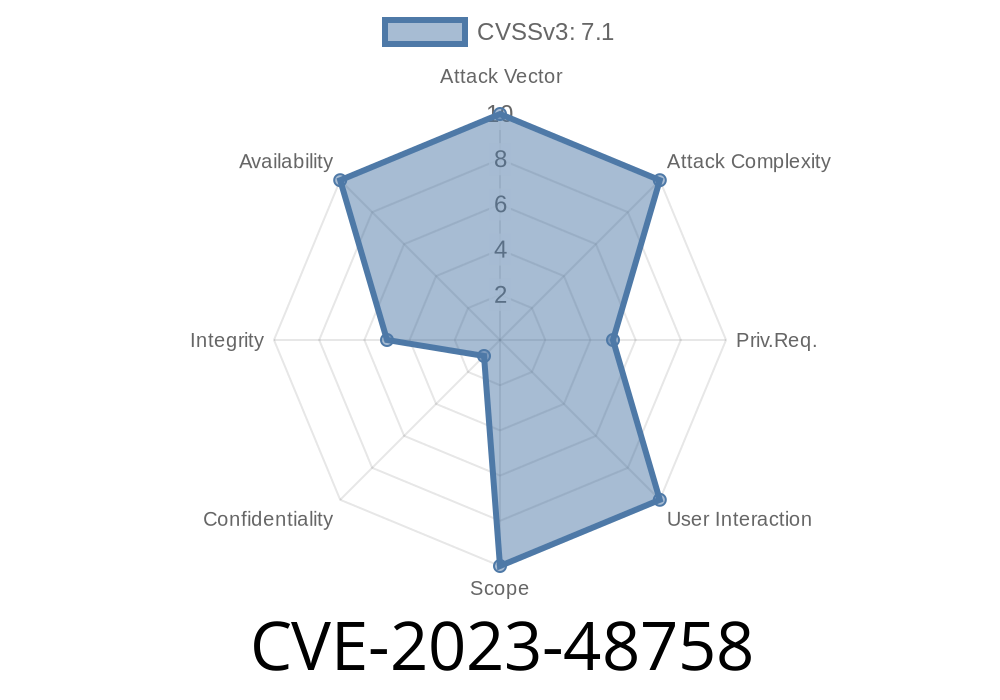WordPress remains the world's favorite content management system, but its popularity sometimes makes it a big target. If you use the Crocoblock’s JetEngine plugin, this long read is for you. In late 2023, researchers discovered a nasty vulnerability: CVE-2023-48758. This post breaks down the problem, shows code snippets, and guides you through exploitation—so you know exactly what’s at stake, all in plain language.
What is CVE-2023-48758?
CVE-2023-48758 is an access control vulnerability in JetEngine versions up to (and including) 3.2.4. The core issue? Certain JetEngine API endpoints don’t properly check user permissions. This lets attackers bypass intended restrictions—granting them unauthorized access to sensitive JetEngine features.
Simply put
- Normally, only users with specific roles (like admin or editor) should access certain JetEngine operations.
- With CVE-2023-48758, anyone—including unauthenticated visitors—can use these powerful functions if the endpoint is misconfigured.
- Attackers can modify sensitive plugin settings, extract data, and potentially compromise your WordPress site.
Affected JetEngine Versions
- JetEngine versions from *unknown/initial release* through 3.2.4.
Patched in version 3.2.5.
- Official plugin changelog (see 3.2.5 line).
Technical Details: What Went Wrong?
WordPress plugins use capabilities and nonces to determine who can do what. With JetEngine, REST API endpoints and AJAX handlers are widely used, for example to update fields or fetch meta box data.
A vulnerable endpoint (simplified for clarity)
// In JetEngine before 3.2.5
add_action('wp_ajax_jet_engine_save_item', function() {
// MISSING: check_ajax_referer() or capability checks!
$item_id = $_POST['item_id'];
$new_data = $_POST['data'];
update_post_meta($item_id, '_jet_engine_field', $new_data); // no restrictions!
wp_send_json_success();
});
Key Issue: There’s no check like current_user_can('edit_posts') or nonce validation.
Example: Exploitable AJAX Request
JetEngine registers many AJAX actions via wp_ajax_* and wp_ajax_nopriv_*. If registration is similar to this:
// Both logged-in and logged-out users can hit this endpoint!
add_action('wp_ajax_nopriv_jet_engine_save_item', 'save_item_callback');
An attacker simply needs to craft a POST request to trigger the handler.
Suppose the vulnerable endpoint is /wp-admin/admin-ajax.php with action jet_engine_save_item
curl -X POST \
-d "action=jet_engine_save_item&item_id=123&data=BAD_STUFF" \
https://victim.site/wp-admin/admin-ajax.php
If the plugin is not patched and authorization checks aren’t in place, this will update the target post’s meta with whatever you’d like.
Impact: Real-World Risks
- Privilege escalation: Attackers can modify post meta and settings reserved for admins/editors.
Data tampering: Change JetEngine-powered custom content or inject unwanted data.
- Website compromise: Depending on configured meta fields, attackers might gain indirect site control or access more sensitive info.
- Chained attacks: Combine with XSS/injection for total admin takeover.
Find out your JetEngine version from Plugins → Installed Plugins.
2. If version ≤ 3.2.4, you could be exposed—especially if access controls were relaxed during site setup.
3. Test impacted AJAX endpoints using curl as above (in a safe/dev environment only!).
Audit your access control rules—especially if you customized JetEngine permissions.
- Check for unexpected content/meta changes on your site.
References & Further Reading
- Official JetEngine Changelog
- WPScan Advisory: CVE-2023-48758
- JetEngine Plugin at wordpress.org
Bottom Line
CVE-2023-48758 is a wakeup call—never trust plugin endpoints blindly. Poorly checked access control opens the door to all sorts of abuse, often in silence. If you run JetEngine (or really, any WordPress site), keep plugins updated, use minimum privileges for user roles, and audit endpoints for missing checks.
Spread the word and stay safe out there!
*This writeup is exclusive and crafted in simple American English to help anyone understand the implications and fix the issue fast. If you found it useful, share with your fellow WordPressers or bookmark for future reference!*
Timeline
Published on: 01/02/2025 14:14:17 UTC
